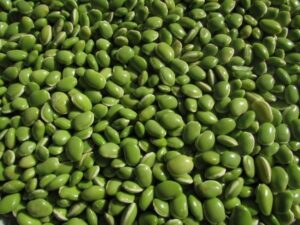Are you curious about rock sugar? This sweet substance has been a staple in various cuisines, particularly in Asian dishes and traditional remedies. But is rock sugar healthy for you? As we dive into the world of this crystalline delight, we’ll explore its nutritional profile, benefits, and potential downsides. Whether you’re considering it as a sugar alternative or simply want to know more about what you’re consuming, this ultimate guide will provide you with all the information you need. Let’s uncover the truth behind rock sugar together!
What is Rock Sugar?
Rock sugar, known as “rock candy,” is a type of sugar that forms large crystalline structures. It’s produced from the process of crystallizing sugar syrup, usually derived from either cane or palm sugars.
This sweetener stands out due to its beautiful, translucent crystals that can vary in size. Its texture is often coarser than granulated sugar, providing a unique crunch when consumed.
Traditionally used in Asian cuisine, rock sugar adds sweetness without overpowering other flavors. You’ll find it in various dishes like herbal teas and desserts.
One notable feature is its mild flavor profile. Unlike white or brown sugars with pronounced sweetness, rock sugar offers a more subtle taste experience. This makes it versatile for both cooking and beverages alike.
Nutritional Value of Rock Sugar
Rock sugar is primarily composed of sucrose, a simple carbohydrate that provides energy. Unlike refined sugars, it undergoes minimal processing, which helps retain some trace minerals.
In terms of calories, rock sugar contains roughly 15 calories per teaspoon. While this may seem low compared to other sweeteners, it’s essential to remember that moderation is key when consuming any form of sugar.
Unlike regular table sugar, rock sugar boasts fewer additives and chemicals. However, its nutritional benefits are still limited. It lacks significant amounts of vitamins or minerals typically found in whole foods.
People often perceive rock sugar as a healthier alternative due to its natural production process and unique taste profile. Still, it’s crucial for consumers to be mindful of their overall dietary habits when incorporating it into meals and beverages.
Benefits of Consuming Rock Sugar
Rock sugar, known for its unique crystalline appearance, offers several benefits that appeal to health-conscious individuals. One notable advantage is its ability to act as a natural sweetener with lower glycemic properties compared to regular sugar. This means it may have less impact on blood sugar levels.
Additionally, rock sugar is often touted for its soothing effects on the throat. Many people use it in teas or warm water during cold seasons to relieve coughs and promote comfort.
Moreover, rock sugar contains trace minerals like calcium and potassium, which are beneficial for overall well-being. These minerals contribute to maintaining healthy bodily functions.
Its gentle sweetness makes it an excellent alternative in various recipes without overwhelming flavors. You can easily blend it into desserts or savory dishes alike while enhancing their taste naturally.
Potential Risks and Side Effects
While rock sugar can be a delightful alternative to refined sugar, it’s important to consider potential risks and side effects.
One major concern is its high carbohydrate content. This can elevate blood sugar levels, which may pose issues for individuals with diabetes or insulin resistance.
Additionally, excessive consumption of any sugar—rock or otherwise—can lead to weight gain. Those watching their calorie intake should be cautious about how much they indulge.
Some people might experience digestive discomfort when consuming larger quantities of rock sugar. Bloating or gas could occur if your body isn’t used to higher amounts of sugars.
There may be allergic reactions in rare cases. If you notice unusual symptoms after trying rock sugar, it’s wise to consult a healthcare professional for guidance on your dietary choices.
How to Incorporate Rock Sugar into Your Diet
Rock sugar can be a delightful addition to your culinary repertoire. It’s perfect for sweetening beverages. Try dissolving it in tea or coffee for a smooth, subtle sweetness.
In cooking, rock sugar shines in Asian dishes. Use it to enhance the flavor of soups and stir-fries. It adds depth without overpowering other ingredients.
For those with a sweet tooth, consider using rock sugar in desserts. Melt it down to create syrup for drizzling over pancakes or ice cream.
You can also incorporate rock sugar into homemade marinades and dressings. Its unique texture creates an interesting contrast when blended with savory flavors.
If you’re feeling adventurous, try adding crushed rock sugar to smoothies for an unexpected twist. The slight crunch pairs well with creamy textures while providing natural sweetness.
Alternatives to Rock Sugar
If you’re looking to replace rock sugar in your cooking or baking, several alternatives can satisfy your sweet tooth.
Honey is a popular choice. Its natural sweetness and distinct flavor add depth to many dishes. Just remember that honey is sweeter than rock sugar, so you may need less.
Agave nectar offers a similar liquid form with a lower glycemic index. It’s an excellent option for those monitoring blood sugar levels.
Coconut sugar has gained popularity as well. It retains some nutrients and fiber from the coconut palm sap, making it a slightly healthier alternative.
For those who prefer a zero-calorie option, stevia shines brightly. This plant-based sweetener is much stronger than regular sugar, meaning only small amounts are needed for the same sweetness level.
Each of these substitutes brings unique flavors and benefits to your meals while allowing you to reduce or eliminate rock sugar from your diet.
Conclusion
Rock sugar is a fascinating sweetener, often regarded as a healthier alternative to refined sugars. Its unique production process and minimal processing appeal to many health-conscious individuals. While it does provide some nutritional benefits, it’s essential to consume rock sugar in moderation.
The nutritional value of rock sugar may not be significantly higher than regular sugar; however, its natural origin can make it an attractive option for those looking for less processed sweeteners. The potential benefits include soothing sore throats and aiding digestion, but these should be weighed against the risks of excessive consumption.
If you’re considering incorporating rock sugar into your diet, there are plenty of delicious ways to do so—whether you’re adding it to teas or using it in desserts. However, always keep alternatives in mind if you seek different options that might offer additional health perks without the caloric load.
While the question “is rock sugar healthy?” doesn’t have a straightforward answer, understanding its place within your overall diet can help guide your choices wisely. Moderation is key when indulging in any form of sweetness!




